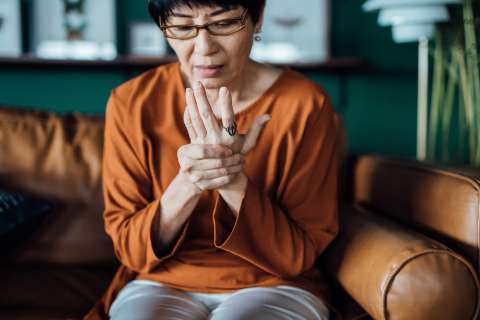The effects of childhood abuse and a lack of parental affection can last a lifetime, taking a toll both emotionally and physically.
Many reports have assessed the psychological damage resulting from childhood abuse; the effects of such abuse on physical health have also been well documented. The "toxic" stress resulting from abuse has been linked to elevated cholesterol, cardiovascular disease, metabolic syndrome and other physical conditions that pose a significant health risk. But research into the physical effects of abuse has so far focused on separate, individual systems rather than on the body as a whole.
Now, a UCLA-led study examines for the first time the effects that abuse and a lack of parental affection have across the body's entire regulatory system and finds a strong biological link for how these negative early-life experiences affect physical health. But the researchers also found that parental warmth can mitigate some the health impact of early abuse.
The study is published online in the journal Proceedings of the National Academy of Science.
"Our findings suggest that there may be a way to reduce the impact abuse has, at least in terms of physical health," said Judith E. Carroll, a research scientist at the Cousins Center for Psychoneuroimmunology at UCLA and lead author of the study. "If the child has love from parental figures, they may be more protected from the impact of the abuse on adult biological risk for health problems than those who don't have that loving adult in their life."
The researchers studied 756 adults who had participated in the Coronary Artery Risk Development in Young Adults (CARDIA) study They measured 18 biological markers of health risk, including blood pressure, heart rate, stress hormones, cholesterol, waist circumference, inflammation and blood-sugar regulation. They added up participants' risks across these markers to create a summary index called "allostatic load." Values at the upper range across these markers indicated they were at higher biological risk for disease.
Previous research has shown that higher levels of allostatic load are associated with an increased likelihood of a negative health event, such as a heart attack or stroke, and with declines in physical or cognitive functioning.
To determine the study subjects' childhood stress, the researchers used a well-validated self-report scale called the Risky Families Questionnaire.
They found a significant link between reports of childhood abuse and multi-system health risks. But those who suffered abuse and reported higher amounts of parental warmth and affection in childhood had lower multi-system health risks than abused individuals who didn't experience such warmth and affection. Conversely, individuals reporting low levels of love and affection and high levels of abuse in childhood had the highest multi-system risk in adulthood.
The researchers suggest that toxic childhood stress alters neural responses to stress, boosting individuals' emotional and physical arousal to threats and making it more difficult for that reaction to be shut off.
"Our findings highlight the extent to which these early childhood experiences are associated with evidence of increased biological risks across nearly all of the body's major regulatory systems," said the paper's senior author, Teresa Seeman, a professor of medicine in the division of geriatrics at the David Geffen School of Medicine at UCLA and a professor of epidemiology at UCLA's Fielding School of Public Health. "If we only look at individual biological parameters such as blood pressure or cholesterol, we would miss the fact that the early childhood experiences are related to a much broader set of biological risk indicators — suggesting the range of health risks that may result from such adverse childhood exposures."
The authors noted that their findings are based on a cross-sectional analysis and do not prove causation. The study used information provided by the participants, so there may be some recall bias. Also, the analysis may not have captured other factors affecting regulatory systems, such as poor nutrition or environmental pollution.
But the findings suggest that parental warmth and affection protect one against the harmful effects of toxic childhood stress, the researchers said.
In addition, because the lingering effects of childhood abuse can be linked to age-related diseases such as cardiovascular disease, this could, among other things, have an effect on long-term health care costs, the authors pointed out.
"It is our hope that this will encourage public policy support for early interventions," Carroll said. "If we intervene early in risky families and at places that provide care for children by educating and training parents, teachers and other caregivers in how to provide a loving and nurturing environment, we may also improve the long-term health trajectories of those kids."
Additional study co-authors were Shelley E. Taylor of UCLA, Tara L. Gruenewald of the University of Southern California, Denise Janicki-Deverts of Carnegie MellonUniversity, and Karen A. Matthews of the University of Pittsburgh.
The CARDIA study is conducted and supported by the National Heart, Lung, and Blood Institute, in collaboration with the University of Alabama at Birmingham (grants N01-HC95095 and N01-HC48047); the University of Minnesota (grant N01-HC48048); Northwestern University (grant N01-HC48049); the Kaiser Foundation Research Institute (grant N01-HC48050); the University of California, Irvine, Echocardiography Reading Center (grant N01-HC-45134); and Harbor–UCLA Research Education Institute and Computed Tomography Reading Center (grant N01-HC-05187). This study was also supported by the MacArthur Research Network on Socioeconomic Status and Health through grants from the John D. and Catherine T. MacArthur Foundation, and by grant T32-MH19925 and the Cousins Center for Psychoneuroimmunology at the UCLA.
The UCLA Cousins Center for Psychoneuroimmunology encompasses an interdisciplinary network of scientists working to advance the understanding of psychoneuroimmunology by linking basic and clinical research programs and by translating findings into clinical practice. The center is affiliated with the Semel Institute for Neuroscience and Human Behavior and the David Geffen School of Medicine at UCLA.
The UCLA Division of Geriatrics within the department of medicine at the David Geffen School of Medicine at UCLA offers comprehensive outpatient and inpatient services at several convenient locations and works closely with other UCLA programs that strive to improve and maintain the quality of life of seniors. UCLA geriatricians are specialists in managing the overall health of people age 65 and older and treating medical disorders that frequently affect the elderly, including memory loss and dementia, falls and immobility, urinary incontinence, arthritis, arthritis, high blood pressure, heart disease, osteoporosis and diabetes. As a result of their specialized training, UCLA geriatricians can knowledgably consider and address a broad spectrum of health-related factors — including medical, psychological and social — when treating patients.



